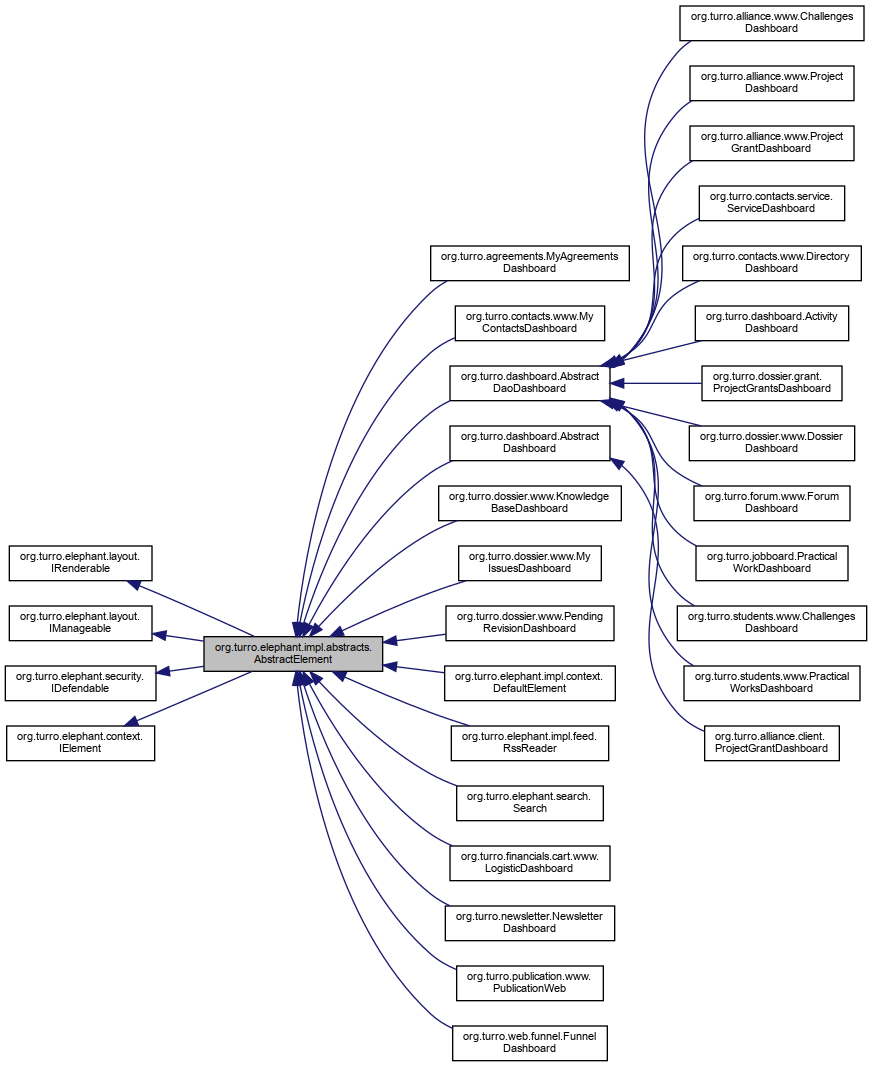
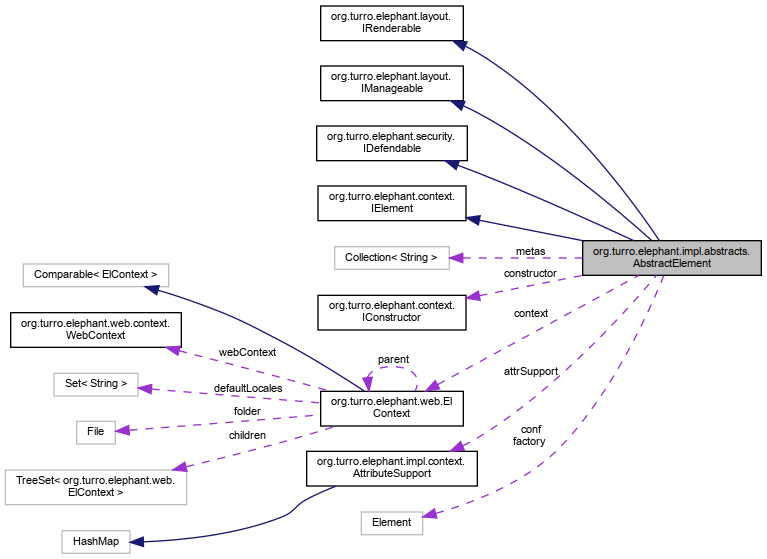
Public Member Functions | |
| AbstractElement () | |
| String | getId () |
| String | getType () |
| String | getTitle () |
| void | setTitle (String title) |
| Collection< String > | getMetas () |
| void | setMetas (Collection< String > metas) |
| ElContext | getContext () |
| IConstructor | getConstructor () |
| void | loadData () throws ServletException, IOException |
| abstract void | startConstruction () throws ServletException, IOException |
| void | setConfiguration (IConstructor constructor, ElContext context) |
| String | getStart () |
| String | getEnd () |
| String | getStartTitle () |
| String | getEndTitle () |
| String | getStartBody () |
| String | getEndBody () |
| String | getStartFooter () |
| String | getEndFooter () |
| String | getStartOption () |
| String | getEndOption () |
| boolean | canDisplay () |
| boolean | isSelectable () |
| boolean | isInRole () |
| boolean | canPrint () |
| String | getElementFolder () |
| boolean | isOriginalContext () |
| void | setRootCategories (ElContext root) |
| String | getTypeName () |
| AttributeSupport | getAttributes () |
| void | applyChanges () |
| void | populateFromParent () |
| void | setDefaultMetas () |
| void | setConfiguration (Element conf, Element factory) |
Protected Attributes | |
| IConstructor | constructor |
| ElContext | context |
| AttributeSupport | attrSupport |
| Element | conf = null |
| String[] | types |
| String | title |
| Collection< String > | metas |
Definition at line 46 of file AbstractElement.java.
| org.turro.elephant.impl.abstracts.AbstractElement.AbstractElement | ( | ) |
Creates a new instance of AbstractElement
Definition at line 57 of file AbstractElement.java.
| void org.turro.elephant.impl.abstracts.AbstractElement.applyChanges | ( | ) |
Implements org.turro.elephant.layout.IManageable.
Definition at line 223 of file AbstractElement.java.
| boolean org.turro.elephant.impl.abstracts.AbstractElement.canDisplay | ( | ) |
This method is queried within startConstruction().
Implements org.turro.elephant.security.IDefendable.
Definition at line 174 of file AbstractElement.java.

| boolean org.turro.elephant.impl.abstracts.AbstractElement.canPrint | ( | ) |
This method is queried when a print version is being called.
Implements org.turro.elephant.security.IDefendable.
Definition at line 192 of file AbstractElement.java.
| AttributeSupport org.turro.elephant.impl.abstracts.AbstractElement.getAttributes | ( | ) |
Implements org.turro.elephant.layout.IManageable.
Definition at line 218 of file AbstractElement.java.

| IConstructor org.turro.elephant.impl.abstracts.AbstractElement.getConstructor | ( | ) |
Implements org.turro.elephant.context.IElement.
Definition at line 97 of file AbstractElement.java.

| ElContext org.turro.elephant.impl.abstracts.AbstractElement.getContext | ( | ) |
Implements org.turro.elephant.context.IElement.
Definition at line 92 of file AbstractElement.java.
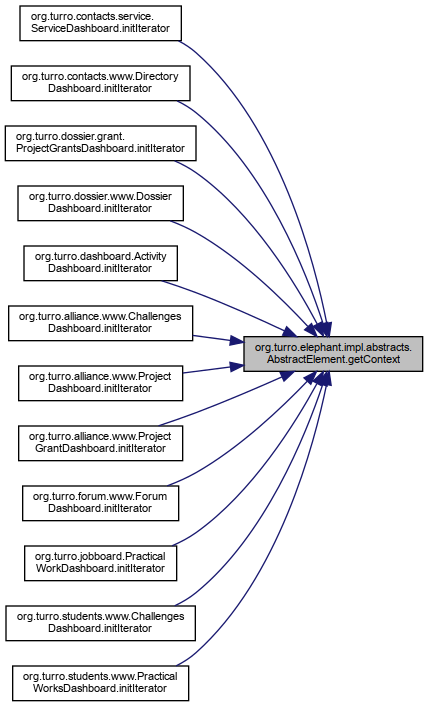
| String org.turro.elephant.impl.abstracts.AbstractElement.getElementFolder | ( | ) |
IElement implementations must ensure this folder is unique within the web application.
Implements org.turro.elephant.context.IElement.
Definition at line 197 of file AbstractElement.java.

| String org.turro.elephant.impl.abstracts.AbstractElement.getEnd | ( | ) |
Implements org.turro.elephant.layout.IRenderable.
Reimplemented in org.turro.elephant.search.Search, org.turro.elephant.impl.feed.RssReader, org.turro.elephant.impl.context.DefaultElement, org.turro.dashboard.AbstractDaoDashboard, org.turro.dashboard.AbstractDashboard, org.turro.agreements.MyAgreementsDashboard, org.turro.publication.www.PublicationWeb, org.turro.newsletter.NewsletterDashboard, org.turro.dossier.www.PendingRevisionDashboard, org.turro.dossier.www.MyIssuesDashboard, org.turro.dossier.www.KnowledgeBaseDashboard, org.turro.contacts.www.MyContactsDashboard, and org.turro.financials.cart.www.LogisticDashboard.
Definition at line 120 of file AbstractElement.java.
| String org.turro.elephant.impl.abstracts.AbstractElement.getEndBody | ( | ) |
Implements org.turro.elephant.layout.IRenderable.
Definition at line 145 of file AbstractElement.java.
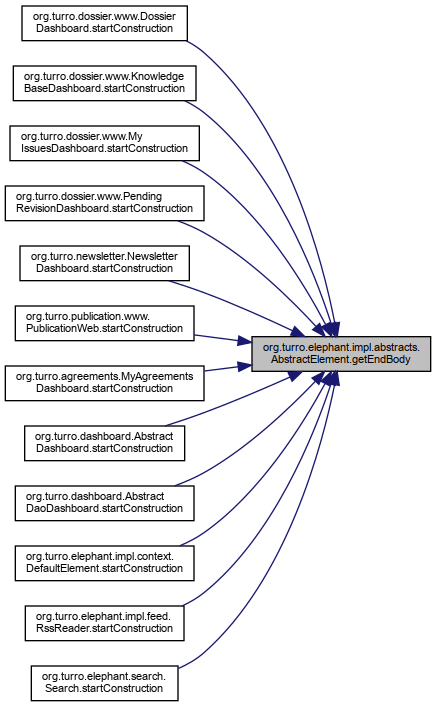
| String org.turro.elephant.impl.abstracts.AbstractElement.getEndFooter | ( | ) |
Implements org.turro.elephant.layout.IRenderable.
Definition at line 159 of file AbstractElement.java.
| String org.turro.elephant.impl.abstracts.AbstractElement.getEndOption | ( | ) |
Implements org.turro.elephant.layout.IRenderable.
Definition at line 169 of file AbstractElement.java.
| String org.turro.elephant.impl.abstracts.AbstractElement.getEndTitle | ( | ) |
Implements org.turro.elephant.layout.IRenderable.
Definition at line 130 of file AbstractElement.java.
| String org.turro.elephant.impl.abstracts.AbstractElement.getId | ( | ) |
Implements org.turro.elephant.context.IElement.
Definition at line 62 of file AbstractElement.java.

| Collection<String> org.turro.elephant.impl.abstracts.AbstractElement.getMetas | ( | ) |
Implements org.turro.elephant.context.IElement.
Definition at line 82 of file AbstractElement.java.
| String org.turro.elephant.impl.abstracts.AbstractElement.getStart | ( | ) |
Implements org.turro.elephant.layout.IRenderable.
Reimplemented in org.turro.elephant.search.Search, org.turro.elephant.impl.feed.RssReader, org.turro.elephant.impl.context.DefaultElement, org.turro.dashboard.AbstractDaoDashboard, org.turro.dashboard.AbstractDashboard, org.turro.agreements.MyAgreementsDashboard, org.turro.publication.www.PublicationWeb, org.turro.newsletter.NewsletterDashboard, org.turro.dossier.www.PendingRevisionDashboard, org.turro.dossier.www.MyIssuesDashboard, org.turro.dossier.www.KnowledgeBaseDashboard, org.turro.contacts.www.MyContactsDashboard, and org.turro.financials.cart.www.LogisticDashboard.
Definition at line 115 of file AbstractElement.java.
| String org.turro.elephant.impl.abstracts.AbstractElement.getStartBody | ( | ) |
Implements org.turro.elephant.layout.IRenderable.
Definition at line 135 of file AbstractElement.java.
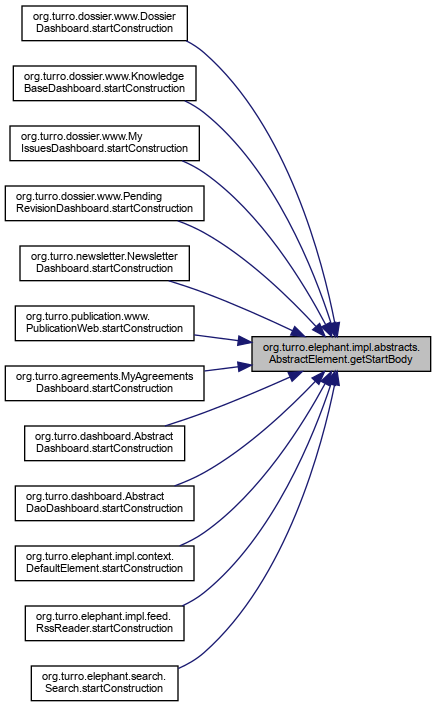
| String org.turro.elephant.impl.abstracts.AbstractElement.getStartFooter | ( | ) |
Implements org.turro.elephant.layout.IRenderable.
Definition at line 154 of file AbstractElement.java.
| String org.turro.elephant.impl.abstracts.AbstractElement.getStartOption | ( | ) |
Implements org.turro.elephant.layout.IRenderable.
Definition at line 164 of file AbstractElement.java.
| String org.turro.elephant.impl.abstracts.AbstractElement.getStartTitle | ( | ) |
Implements org.turro.elephant.layout.IRenderable.
Definition at line 125 of file AbstractElement.java.
| String org.turro.elephant.impl.abstracts.AbstractElement.getTitle | ( | ) |
Implements org.turro.elephant.context.IElement.
Definition at line 72 of file AbstractElement.java.
| String org.turro.elephant.impl.abstracts.AbstractElement.getType | ( | ) |
Implements org.turro.elephant.context.IElement.
Definition at line 67 of file AbstractElement.java.


| String org.turro.elephant.impl.abstracts.AbstractElement.getTypeName | ( | ) |
Implements org.turro.elephant.layout.IManageable.
Definition at line 213 of file AbstractElement.java.

| boolean org.turro.elephant.impl.abstracts.AbstractElement.isInRole | ( | ) |
This method points to an specific role, know at configuration time. To achieve more control on roles use constructor's, which takes a parameter with a role.
Implements org.turro.elephant.security.IDefendable.
Definition at line 184 of file AbstractElement.java.
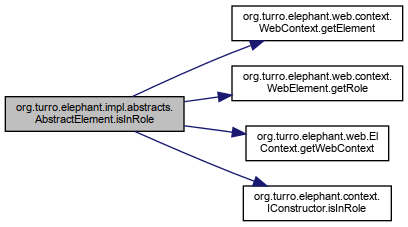

| boolean org.turro.elephant.impl.abstracts.AbstractElement.isOriginalContext | ( | ) |
Implements org.turro.elephant.context.IElement.
Definition at line 202 of file AbstractElement.java.

| boolean org.turro.elephant.impl.abstracts.AbstractElement.isSelectable | ( | ) |
Selectable elements may respond to user input.
Implements org.turro.elephant.security.IDefendable.
Definition at line 179 of file AbstractElement.java.
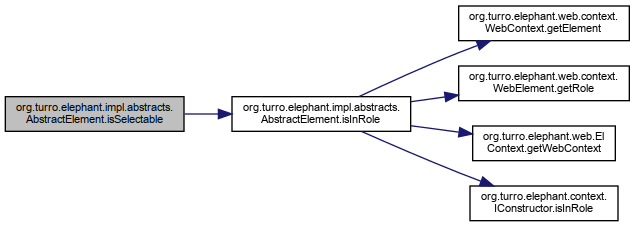

| void org.turro.elephant.impl.abstracts.AbstractElement.loadData | ( | ) | throws ServletException, IOException |
This method loads element's data. It gets called within IConstructor.startConstruction() and before element's startConstruction() method.
| javax.servlet.ServletException | |
| java.io.IOException |
Implements org.turro.elephant.context.IElement.
Reimplemented in org.turro.elephant.impl.context.DefaultElement, org.turro.dashboard.AbstractDaoDashboard, org.turro.dashboard.AbstractDashboard, org.turro.agreements.MyAgreementsDashboard, org.turro.publication.www.PublicationWeb, org.turro.newsletter.NewsletterDashboard, org.turro.dossier.www.PendingRevisionDashboard, org.turro.dossier.www.MyIssuesDashboard, org.turro.dossier.www.KnowledgeBaseDashboard, org.turro.contacts.www.MyContactsDashboard, and org.turro.financials.cart.www.LogisticDashboard.
Definition at line 102 of file AbstractElement.java.
| void org.turro.elephant.impl.abstracts.AbstractElement.populateFromParent | ( | ) |
Implements org.turro.elephant.layout.IManageable.
Definition at line 227 of file AbstractElement.java.
| void org.turro.elephant.impl.abstracts.AbstractElement.setConfiguration | ( | Element | conf, |
| Element | factory | ||
| ) |
Definition at line 251 of file AbstractElement.java.

| void org.turro.elephant.impl.abstracts.AbstractElement.setConfiguration | ( | IConstructor | constructor, |
| ElContext | context | ||
| ) |
Implements org.turro.elephant.context.IElement.
Definition at line 109 of file AbstractElement.java.
| void org.turro.elephant.impl.abstracts.AbstractElement.setDefaultMetas | ( | ) |
Definition at line 230 of file AbstractElement.java.
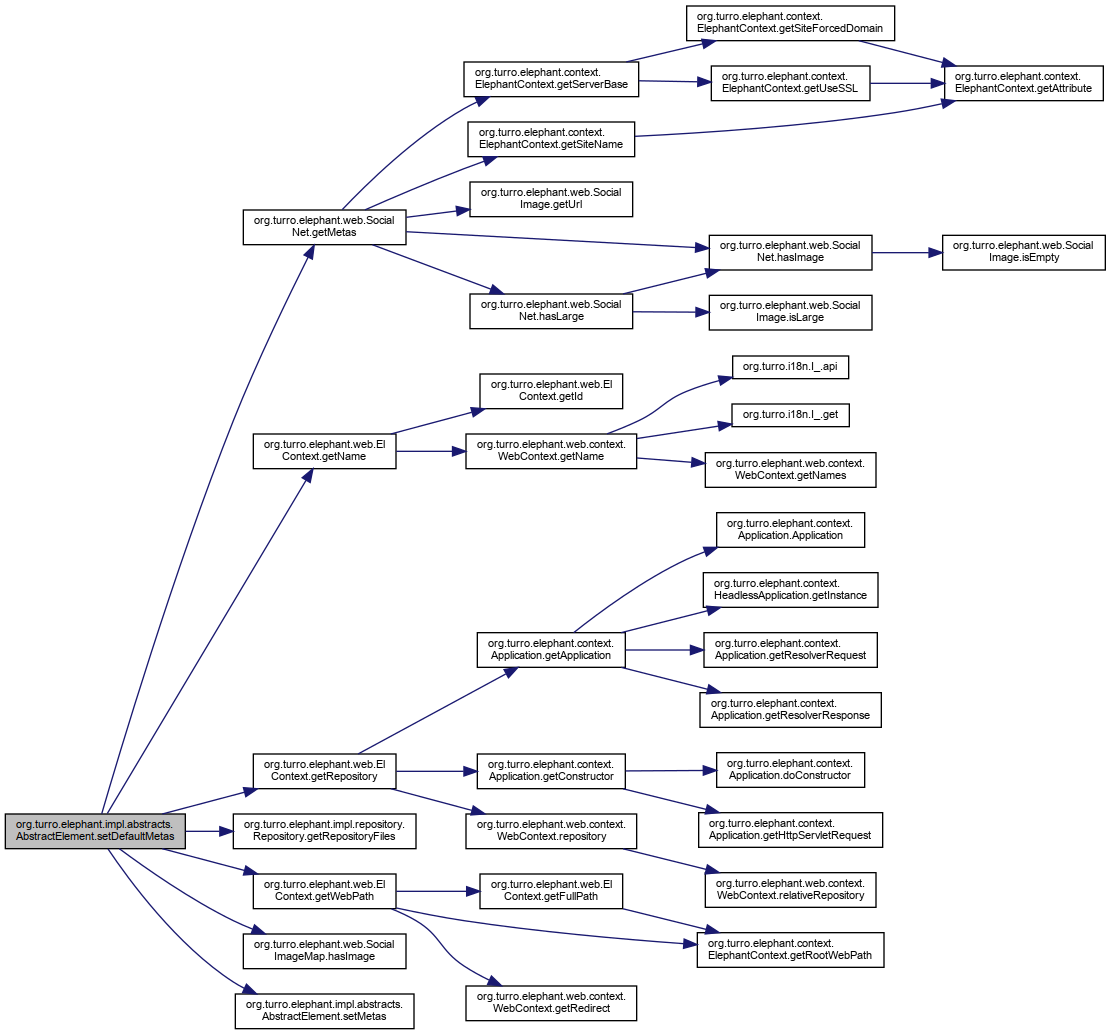
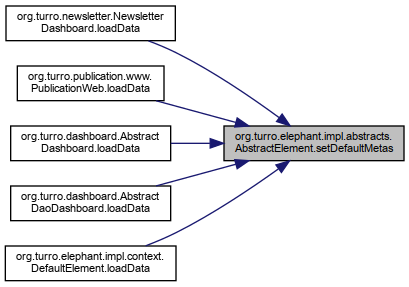
| void org.turro.elephant.impl.abstracts.AbstractElement.setMetas | ( | Collection< String > | metas | ) |
Implements org.turro.elephant.context.IElement.
Definition at line 87 of file AbstractElement.java.
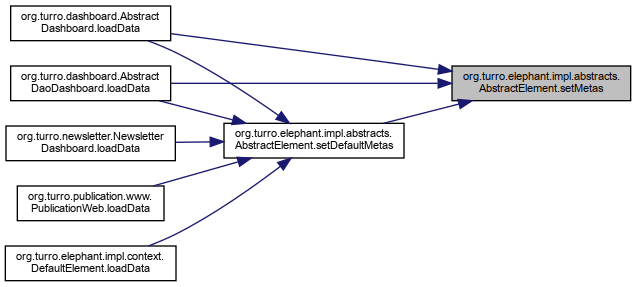
| void org.turro.elephant.impl.abstracts.AbstractElement.setRootCategories | ( | ElContext | root | ) |
| root | Categories root Calls |
Implements org.turro.elephant.context.IElement.
Reimplemented in org.turro.publication.www.PublicationWeb, and org.turro.dossier.www.DossierDashboard.
Definition at line 208 of file AbstractElement.java.
| void org.turro.elephant.impl.abstracts.AbstractElement.setTitle | ( | String | title | ) |
Implements org.turro.elephant.context.IElement.
Definition at line 77 of file AbstractElement.java.

|
abstract |
This method start element's construction. It gets called within IConstructor.startConstruction().
| javax.servlet.ServletException | |
| java.io.IOException |
Implements org.turro.elephant.context.IElement.
Reimplemented in org.turro.elephant.search.Search, org.turro.elephant.impl.feed.RssReader, org.turro.elephant.impl.context.DefaultElement, org.turro.dashboard.AbstractDaoDashboard, org.turro.web.funnel.FunnelDashboard, org.turro.dashboard.AbstractDashboard, org.turro.agreements.MyAgreementsDashboard, org.turro.publication.www.PublicationWeb, org.turro.newsletter.NewsletterDashboard, org.turro.dossier.www.PendingRevisionDashboard, org.turro.dossier.www.MyIssuesDashboard, org.turro.dossier.www.KnowledgeBaseDashboard, org.turro.dossier.www.DossierDashboard, org.turro.contacts.www.MyContactsDashboard, and org.turro.financials.cart.www.LogisticDashboard.
|
protected |
Definition at line 50 of file AbstractElement.java.
|
protected |
Definition at line 51 of file AbstractElement.java.
|
protected |
Definition at line 48 of file AbstractElement.java.
|
protected |
Definition at line 49 of file AbstractElement.java.
|
protected |
Definition at line 54 of file AbstractElement.java.
|
protected |
Definition at line 53 of file AbstractElement.java.
|
protected |
Definition at line 52 of file AbstractElement.java.